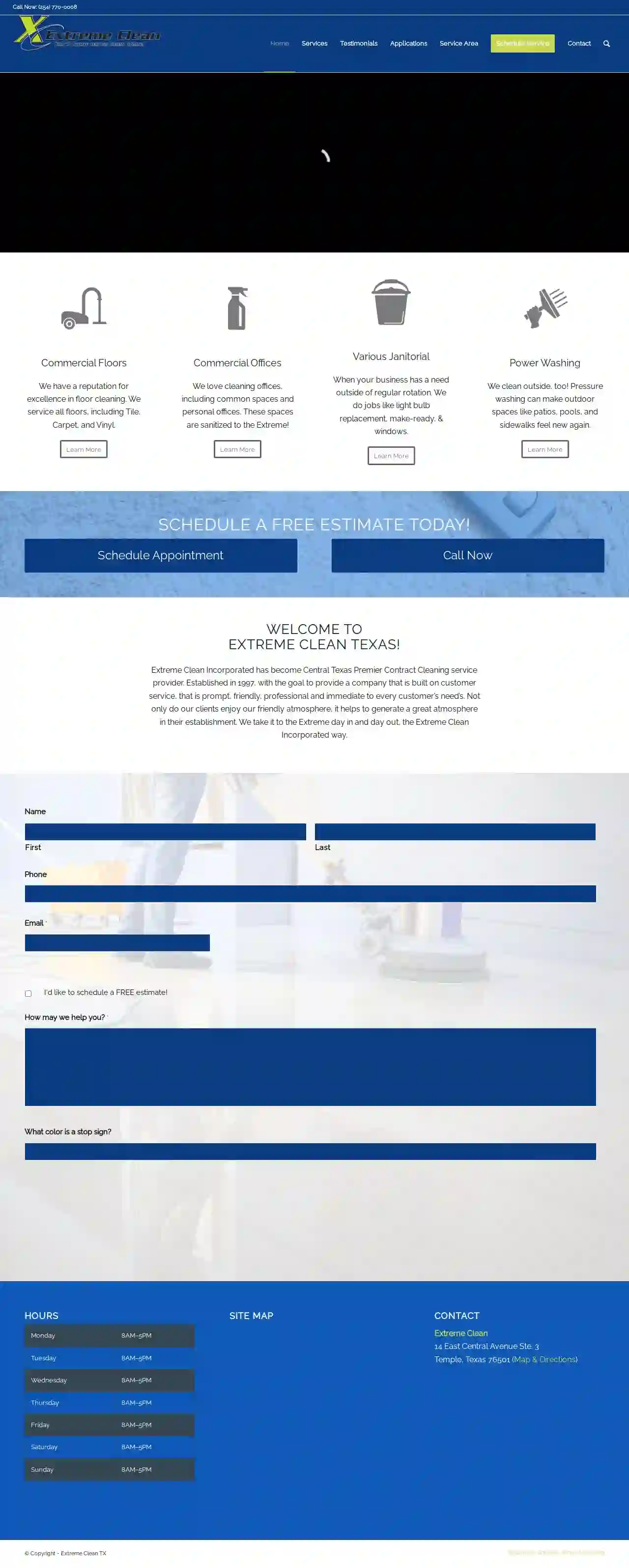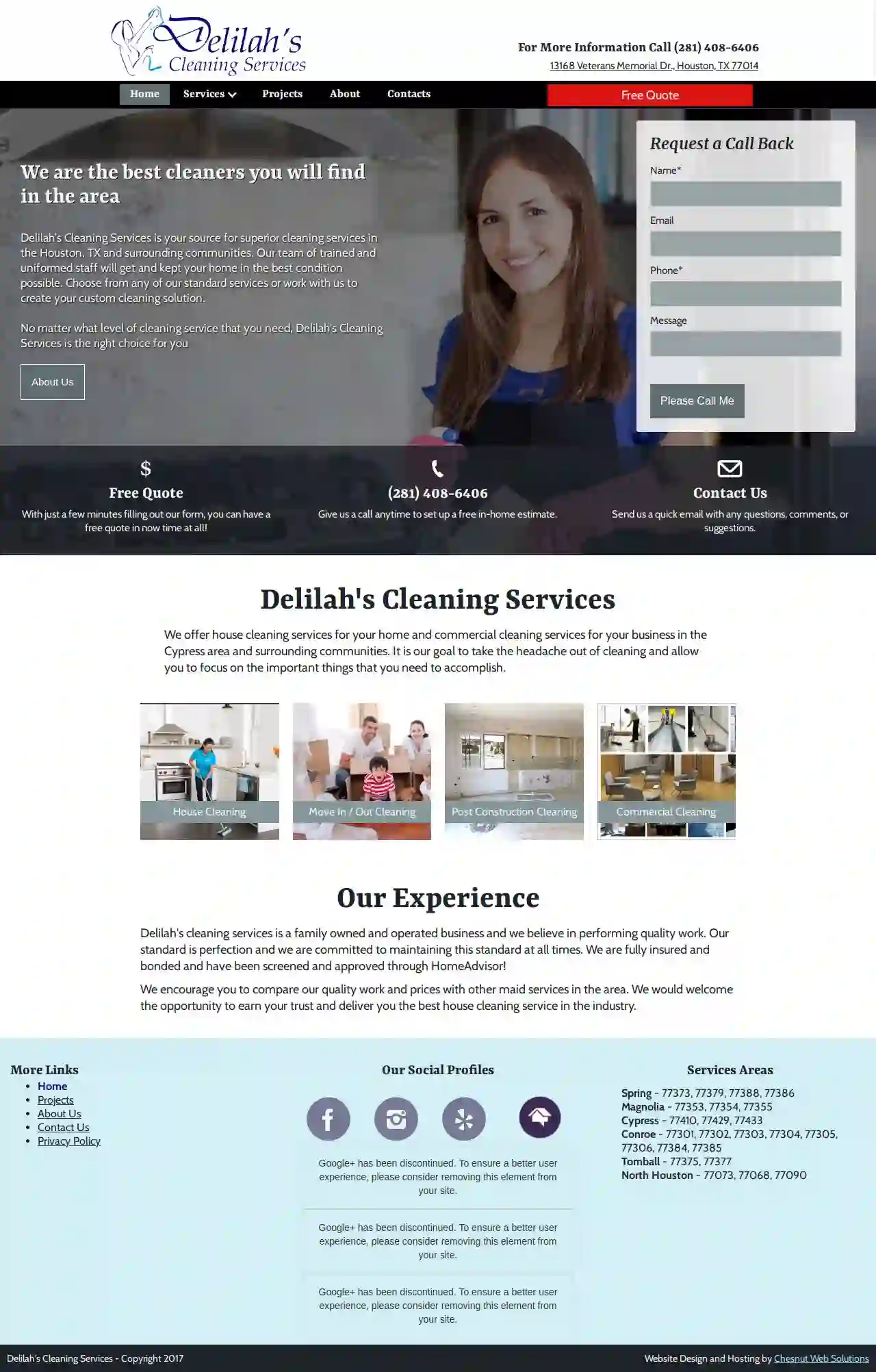Cleaning Services Denver City
Find Cleaning in Denver City
Receive multiple Apartment Cleaning quotes for your project today! Compare profiles, reviews, accreditations, portfolio, etc... and choose the best deal.

Northtown Vacuum Inc. Sales and Service
4.950 reviewsSpring, US- Services
- Why Us?
- Gallery
Get Quote
Tidy If You Please, LLC. Green House Cleaning And Office Cleaning
525 reviewsSan Antonio, USTidy If You Please, LLC. Professional House Cleaning & Office Cleaning in San Antonio. Green Seal Certified Cleaning Products. Equipment and Supplies Provided. Recurring Maid Service in San Antonio including: 78209 78253 78245 78252 78251 78250 78009 78023 78254 Meet the Manager Elizabeth Elizabeth has mastered the skill of home & office cleaning. With an attention to detail she carefully inspects the homes & offices serviced by Tidy If You Please, LLC to ensure they are up to our standards. She enjoys leading the team with fun & upbeat attitude. When not working she loves camping and enjoying the beaches.
- Services
- Why Us?
- Our Team
- Testimonials
- Gallery
Get Quote
Multitasking Cleaning Services LLC
59 reviews21750 Hardy Oak Blvd, San Antonio, TX, 78258, USMultitasking Cleaning Services is a dedicated team specializing in move-in, move-out, and Airbnb cleaning services, ensuring every corner of your new or old home is spotless. With over 1,000 cleans under their belt, they have consistently proven their reliability and commitment to quality. Their team's passion for providing top-notch cleaning services has driven their success since 2021. They offer a wide range of cleaning services for various facilities including offices, shops, medical facilities, factories, restaurants, airports, showrooms, movie theaters, daycares, gyms, and government facilities.
- Services
- Why Us?
- Testimonials
- Gallery
Get Quote
Extreme Clean
4.9132 reviewsWaco, US- Services
- Why Us?
- Gallery
Get Quote
Rodriguez Commercial Cleaning and Janitorial
55 reviewsSan Antonio, US- Services
- Why Us?
- Gallery
Get Quote
City Wide Facility Solutions - San Antonio
4.9113 reviewsSan Antonio, US- Services
- Why Us?
- Gallery
Get Quote
Enviro-Master of San Antonio
5933 reviewsSan Antonio, US- Services
- Why Us?
- Gallery
Get Quote
Delilah's Cleaning Services
4.950 reviewsHouston, US- Services
- Why Us?
- Gallery
Get Quote
Maids on a Mission
4.9396 reviewsSan Antonio, US- Services
- Why Us?
- Gallery
Get Quote- Su
Supreme Maintenance Solutions(SA)
57 reviewsSan Antonio, US- Services
- Why Us?
Get Quote
Over 60,241+ Cleaning Businesses onboarded
Our cleaning pros operate in Denver City & surrounding areas!
CleaningMatch has curated and vetted Top Janitorial Contractors arround Denver City. Find a trustworthy pro today.
Frequently Asked Questions About Cleaning Services
- Ventilation: Open windows and turn on the exhaust fan to improve air circulation.
- Declutter: Remove any items from countertops, the shower, and the floor to allow easy access.
- Pre-treat: Spray shower walls, tub, and toilet bowl with bathroom cleaner and let it sit for a few minutes to break down grime.
- Toilet: Scrub the toilet bowl with a toilet brush, paying attention to the rim and under the seat. Wipe down the exterior of the toilet with a disinfectant wipe.
- Shower/Tub: Scrub the shower walls and tub with a sponge or scrub brush. Rinse thoroughly.
- Sink: Clean the sink with a sponge or cloth and bathroom cleaner. Pay attention to the faucet and drain.
- Mirrors and Glass: Wipe down mirrors and glass surfaces with a glass cleaner and a microfiber cloth for a streak-free finish.
- Floors: Sweep or vacuum the floor, then mop with a floor cleaner designed for your bathroom floor type.
- Finishing Touches: Empty the trash can, replace towels, and put away any toiletries.
- Using the wrong cleaning products: Certain cleaning products are unsuitable for specific surfaces. Using abrasive cleaners on delicate surfaces can cause scratches or discoloration.
- Not reading product instructions: Always read and follow the instructions on cleaning products to ensure proper usage and avoid potential hazards.
- Using dirty cleaning tools: Dirty cloths, sponges, and mops can spread germs and dirt instead of cleaning them. Rinse and sanitize your cleaning tools regularly.
- Skipping ventilation: Proper ventilation is essential when using cleaning products, especially those with strong fumes. Open windows and doors to allow fresh air circulation.
- Not allowing sufficient drying time: After cleaning, allow surfaces to dry completely to prevent mold and mildew growth, particularly in humid areas like bathrooms.
- Ignoring clutter: Clutter makes cleaning more difficult and time-consuming. Declutter regularly to maintain a cleaner and more organized home.
- White Vinegar: A versatile cleaner that cuts through grease, removes stains, and deodorizes. Mix equal parts water and vinegar for a general-purpose cleaner.
- Baking Soda: A natural abrasive and deodorizer. Sprinkle baking soda on surfaces, let it sit, then scrub and rinse.
- Lemon Juice: Acts as a natural bleaching agent and disinfectant. Mix lemon juice with water for a cleaning solution or use it directly on stains.
- Castile Soap: A gentle and biodegradable soap made from plant oils. Mix a few drops of castile soap with water for a versatile cleaning solution.
- Essential Oils: Add a few drops of essential oils like tea tree oil or lavender oil to cleaning solutions for a natural fragrance and antibacterial properties.
- Declutter Regularly: Set aside time regularly to declutter your belongings. Donate, sell, or discard items you no longer use or need.
- Designated Storage: Assign specific storage spaces for different items, such as shelves for books, drawers for clothes, and containers for toys.
- Labeling: Label storage containers and drawers to make it easy to find items and put them back in their designated places.
- 'One In, One Out' Rule: For every new item you bring into your home, get rid of an old one. This prevents clutter from accumulating.
- Vertical Storage: Utilize vertical storage solutions, such as shelves, wall organizers, and hanging racks, to maximize space.
- Digital Organization: Organize digital files and emails to reduce paper clutter. Use cloud storage services to free up space on your computer.
What is the best way to clean a bathroom?
By following these steps, you can maintain a clean and hygienic bathroom.
What are some common cleaning mistakes to avoid?
By avoiding these common cleaning mistakes, you can improve your cleaning efficiency and achieve better results.
What are some eco-friendly cleaning solutions?
Remember to test these solutions on a small, inconspicuous area first to ensure they don't damage delicate surfaces.
What are some tips for keeping my home organized and clutter-free?
By adopting these strategies, you can create a more organized and clutter-free home, promoting a sense of calm and efficiency.
What is the best way to clean a bathroom?
- Ventilation: Open windows and turn on the exhaust fan to improve air circulation.
- Declutter: Remove any items from countertops, the shower, and the floor to allow easy access.
- Pre-treat: Spray shower walls, tub, and toilet bowl with bathroom cleaner and let it sit for a few minutes to break down grime.
- Toilet: Scrub the toilet bowl with a toilet brush, paying attention to the rim and under the seat. Wipe down the exterior of the toilet with a disinfectant wipe.
- Shower/Tub: Scrub the shower walls and tub with a sponge or scrub brush. Rinse thoroughly.
- Sink: Clean the sink with a sponge or cloth and bathroom cleaner. Pay attention to the faucet and drain.
- Mirrors and Glass: Wipe down mirrors and glass surfaces with a glass cleaner and a microfiber cloth for a streak-free finish.
- Floors: Sweep or vacuum the floor, then mop with a floor cleaner designed for your bathroom floor type.
- Finishing Touches: Empty the trash can, replace towels, and put away any toiletries.
By following these steps, you can maintain a clean and hygienic bathroom.
What are some common cleaning mistakes to avoid?
- Using the wrong cleaning products: Certain cleaning products are unsuitable for specific surfaces. Using abrasive cleaners on delicate surfaces can cause scratches or discoloration.
- Not reading product instructions: Always read and follow the instructions on cleaning products to ensure proper usage and avoid potential hazards.
- Using dirty cleaning tools: Dirty cloths, sponges, and mops can spread germs and dirt instead of cleaning them. Rinse and sanitize your cleaning tools regularly.
- Skipping ventilation: Proper ventilation is essential when using cleaning products, especially those with strong fumes. Open windows and doors to allow fresh air circulation.
- Not allowing sufficient drying time: After cleaning, allow surfaces to dry completely to prevent mold and mildew growth, particularly in humid areas like bathrooms.
- Ignoring clutter: Clutter makes cleaning more difficult and time-consuming. Declutter regularly to maintain a cleaner and more organized home.
By avoiding these common cleaning mistakes, you can improve your cleaning efficiency and achieve better results.
What are some eco-friendly cleaning solutions?
- White Vinegar: A versatile cleaner that cuts through grease, removes stains, and deodorizes. Mix equal parts water and vinegar for a general-purpose cleaner.
- Baking Soda: A natural abrasive and deodorizer. Sprinkle baking soda on surfaces, let it sit, then scrub and rinse.
- Lemon Juice: Acts as a natural bleaching agent and disinfectant. Mix lemon juice with water for a cleaning solution or use it directly on stains.
- Castile Soap: A gentle and biodegradable soap made from plant oils. Mix a few drops of castile soap with water for a versatile cleaning solution.
- Essential Oils: Add a few drops of essential oils like tea tree oil or lavender oil to cleaning solutions for a natural fragrance and antibacterial properties.
Remember to test these solutions on a small, inconspicuous area first to ensure they don't damage delicate surfaces.
What are some tips for keeping my home organized and clutter-free?
- Declutter Regularly: Set aside time regularly to declutter your belongings. Donate, sell, or discard items you no longer use or need.
- Designated Storage: Assign specific storage spaces for different items, such as shelves for books, drawers for clothes, and containers for toys.
- Labeling: Label storage containers and drawers to make it easy to find items and put them back in their designated places.
- 'One In, One Out' Rule: For every new item you bring into your home, get rid of an old one. This prevents clutter from accumulating.
- Vertical Storage: Utilize vertical storage solutions, such as shelves, wall organizers, and hanging racks, to maximize space.
- Digital Organization: Organize digital files and emails to reduce paper clutter. Use cloud storage services to free up space on your computer.
By adopting these strategies, you can create a more organized and clutter-free home, promoting a sense of calm and efficiency.